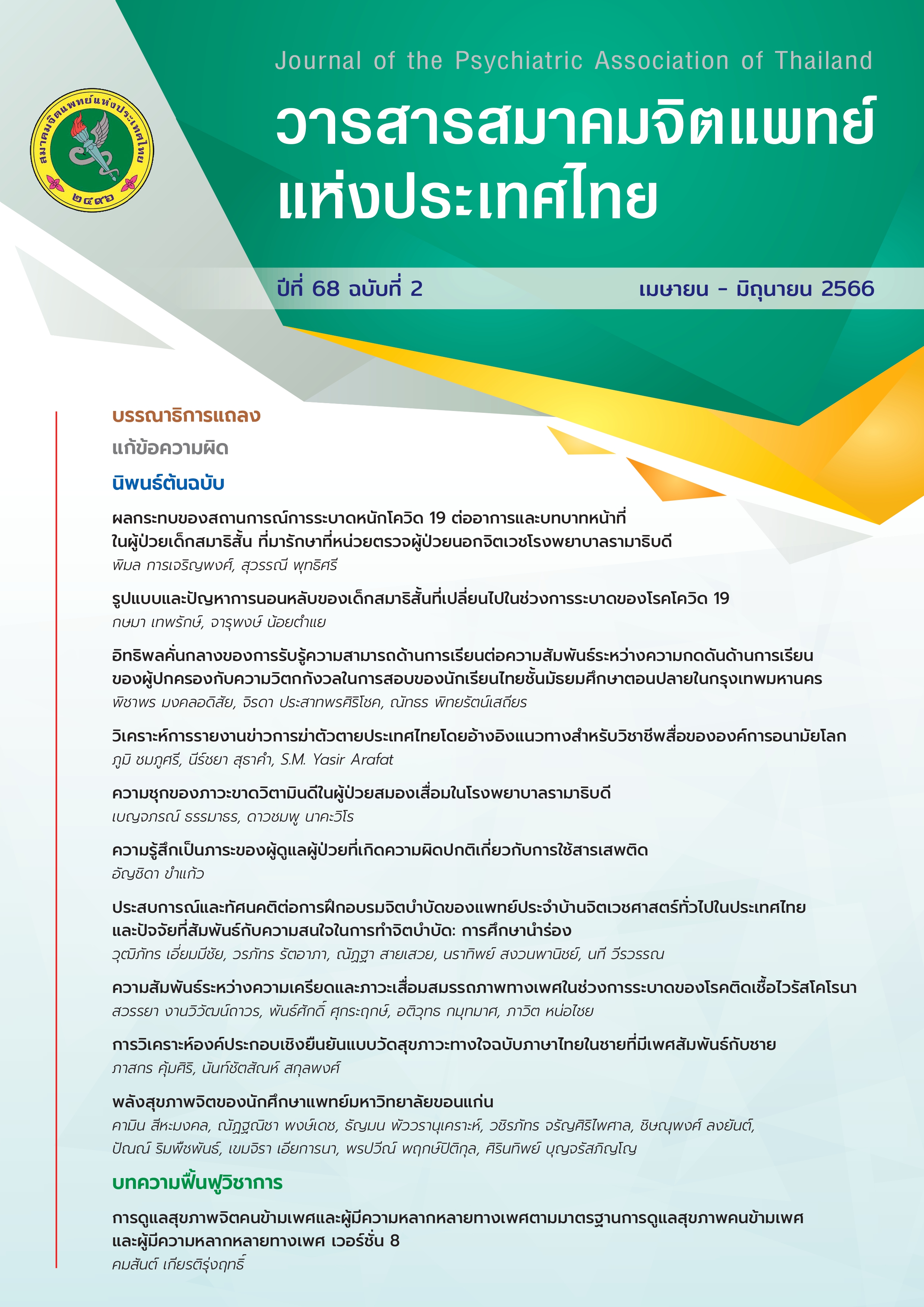Experiences in and Attitudes Toward Psychotherapy Training of General Psychiatry Residents in Thailand and Factors Associated With Psychotherapy Interest: A Pilot Study
Main Article Content
Abstract
Objective: To explore psychotherapy delivering experiences, attitude toward psychotherapy, and factors associated with the psychotherapy interest of general psychiatry residents in Thailand.
Methods: The present study comprised two phases. In the first phase, one or two psychiatry residents from each training institute in Thailand were randomly selected to answer the online open-ended questionnaire for evaluate experiences and attitude toward psychotherapy. Then, the Likert-type questionnaire was developed by using gathered information. It was validated by three content experts from different institutions. In the second phase, the developed online Likert-type questionnaire was used to assess attitude toward psychotherapy, psychotherapy delivering and supervision experiences, and factors associated with psychotherapy interest of general psychiatry residents in Thailand.
Results: In the second phase, 29 participants responded (21.0% of all general psychiatry residents in Thailand). 89.7% had delivered psychotherapy (Median 12 sessions, IQR [4, 15]). 84.0% of participants attended supervision regularly. 93.1% reported they would further provide psychotherapy. 48.3% said work overload was a barrier for psychotherapy practice. The attitude “Some patients need psychotherapy to make their symptoms better” was positively correlated with psychotherapy interest (r=0.69, p<0.01). On the other hand, the attitudes “Psychotherapy is unnecessary because other treatments are more effective” and “Supervisors cannot help me with my negative psychological impacts from psychotherapy” were negatively correlated with psychotherapy interest (r=-0.59, p=0.02 and r=-0.57, p=0.03, respectively). Self-confidence in knowledge and skills for psychotherapy positively correlated with psychotherapy interest of first-year residents (r=0.60, p=0.02 and r=0.57, p=0.03, respectively).
Conclusions: Attitude toward the effectiveness of psychotherapy, self-confidence in psychotherapy skills and knowledge, and psychological support from supervisors were correlated with psychotherapy interest.
Article Details

This work is licensed under a Creative Commons Attribution-NonCommercial-NoDerivatives 4.0 International License.
Articles submitted for consideration must not have been previously published or accepted for publication in any other journal, and must not be under review by any other journal.
References
Gabbard GO. Psychotherapy in psychiatry. International Review of Psychiatry 2007;19(1):5–12.
Marwood L, Wise T, Perkins AM, Cleare AJ. Meta-analyses of the neural mechanisms and predictors of response to psychotherapy in depression and anxiety. Neurosci Biobehav Rev 2018;95:61–72.
Tavakoli S. The place of psychotherapy in contemporary psychiatry. Iran J Psychiatry Behav Sci 2014;8(4).
Cuijpers P, Berking M, Andersson G, Quigley L, Kleiboer A, Dobson KS. A meta-analysis of cognitive-behavioural therapy for adult depression, alone and in comparison with other treatments. Can J Psychiatry 2013;58(7):376–85.
Hazell CM, Hayward M, Cavanagh K, Strauss C. A systematic review and meta-analysis of low intensity CBT for psychosis. Clin Psychol Rev 2016;45:183–92.
Lutgens D, Gariepy G, Malla A. Psychological and psychosocial interventions for negative symptoms in psychosis: Systematic review and meta-analysis. Br J Psychiatry 2017;210(5):324–32.
Katzman MA, Bleau P, Blier P, Chokka P, Kjernisted K, Van Ameringen M. Canadian clinical practice guidelines for the management of anxiety, posttraumatic stress and obsessive-compulsive disorders. BMC Psychiatry 2014;14(Suppl 1).
Parikh SV, Quilty LC, Ravitz P, Rosenbluth M, Pavlova B, Grigoriadis S, et al. Canadian network for mood and anxiety treatments (CANMAT) 2016 clinical guidelines for the management of adults with major depressive disorder. Can J Psychiatry 2016;61(9):524–39.
Holmes J, Mizen S, Jacobs C. Psychotherapy training for psychiatrists: UK and global perspectives. International Review of Psychiatry 2007;19(1):93–100.
Accreditation Council for Graduate Medical Education [Internet]. ACGME program requirements for graduate medical education in psychiatry.2017 Jul 1 [cited 2020]2107. Available from https://www.acgme.org/Portals/0/PFAssets/ProgramRequirements/400_psychiatry_2017-07-01.pdf.
The Royal College of Physicians and Surgeons of Canada [Internet]. Specialty training requirements in psychiatry. 2015 [cited 2020]. Available from https://www.royalcollege.ca/rcsite/documents/ibd/psychiatry_str_e.pdf
Royal College of Psychiatrists [Internet]. A competency based curriculum for specialist core training in psychiatry. 2017 [cited 2020]. Available from https://www.acgme.org/search/?q=program%20requirement%20psychiatry
Ravitz P, Lawson A, Fefergrad M, Rawkins S, Lancee W, Maunder R, et al. Psychotherapy competency milestones: An exploratory pilot of CBT and psychodynamic psychotherapy skills acquisition in junior psychiatry residents. Academic Psychiatry 2018;43(1):61–6.
Hadjipavlou G, Ogrodniczuk JS. A national survey of Canadian psychiatry residents' perceptions of psychotherapy training. Can J Psychiatry 2007;52(11):710–7.
Schmidt LM, Foli-Andersen NJ. Psychotherapy and cognitive behavioral therapy supervision in Danish psychiatry: Training the next generation of psychiatrists. Academic Psychiatry 2015;41(1):4–9.
Kovach JG, Dubin WR, Combs CJ. Psychotherapy training: Residents’ perceptions and experiences. Academic Psychiatry 2014;39(5):567–74.
Zisook S, Mcquaid JR, Sciolla A, Lanouette N, Calabrese C, Dunn LB. Psychiatric residents’ interest in psychotherapy and training stage: A multi-site survey. American Journal of Psychotherapy 2011;65(1):47–59.
ราชวิทยาลัยจิตแพทย์แห่งประเทศไทย [อินเตอร์เน็ต]. หลักสูตรและเกณฑ์การฝึกอบรมแพทย์ประจำบ้าน เพื่อวุฒิบัตรแสดงความรู้ความชำนาญในการประกอบวิชาชีพเวชกรรม สาขาวิชาจิตเวชศาสตร์ ฉบับ พ.ศ. 2561: ปรับปรุงเมื่อ 2 กุมภาพันธ์ 2561 [เข้าถึงเมื่อ 2561].เข้าถึงได้จาก https://www.rcpsycht.org/th/training/info
Pariwatcharakul P, Saisavoey N, Ratta-apha W, Singhakant S, Sitdhiraksa N, Wannarit K, et al. Psychotherapy training in Thailand: Psychiatry residents’ perspective. J Psychiatr Assoc Thailand 2012;57(2):199–211.
Shachar OL, Mendlovic S, Hertzberg L, Baruch Y, Lurie I. Individual psychotherapy (“Talking Therapy”): A survey of attitudes among residents & specialists in psychiatry; Israel 2010-2011. Isr J Psychiatry Relat Sci 2016;53:48–57.
Radu GM, Harris GE, Bonnell W, Bursey K. Psychiatry trainees’ attitudes towards psychotherapy. Open Journal of Medical Psychology 2015;04(04):124–30.
AlOtaibi R, AlHadi A, AlObaid LL. Psychiatric resident attitudes towards psychotherapy training and associated factors. Ulutas Med J 2018;4(3):124.
Charernboon T, Phanasathit M. Psychotherapy practices and training experiences: A national survey of young Thai psychiatrists. J Med Assoc Thailand 2011;94:95–101.


